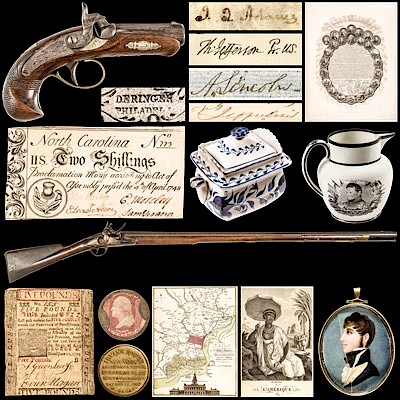1742 ISAAC WINSLOW Boston TEA PARTY Merchant Autograph Letter Signed
Lot 125
Categories
Estimate:
$600 - $800
Absentee vs Live bid
Two ways to bid:
- Leave a max absentee bid and the platform will bid on your behalf up to your maximum bid during the live auction.
- Bid live during the auction and your bids will be submitted real-time to the auctioneer.
Bid Increments
| Price | Bid Increment |
|---|---|
| $0 | $10 |
| $200 | $20 |
| $300 | $25 |
| $500 | $50 |
| $1,000 | $100 |
| $2,000 | $200 |
| $3,000 | $250 |
| $5,000 | $500 |
| $10,000 | $1,000 |
| $20,000 | $2,000 |
| $30,000 | $2,500 |
| $50,000 | $5,000 |
| $100,000 | $10,000 |
| $200,000 | $20,000 |
| $300,000 | $25,000 |
| $500,000 | $50,000 |
About Auction
By Early American History Auctions
Oct 19, 2019
Set Reminder
2019-10-19 12:00:00
2019-10-19 12:00:00
America/New_York
Bidsquare
Bidsquare : Historic Autographs-Currency-Political-Americana-Militaria-Guns
https://www.bidsquare.com/auctions/early-american-history-auctions/historic-autographs-currency-political-americana-militaria-guns-4513
326 Lots of Rare, Historic Autographs, Americana, Civil War Era, George Washington, Abraham Lincoln, Black History, Revolutionary War Era, Colonial America, Federal Period, War of 1812, Colonial Currency, Indian Peace Medals & more... Early American History Auctions auctions@earlyamerican.com
326 Lots of Rare, Historic Autographs, Americana, Civil War Era, George Washington, Abraham Lincoln, Black History, Revolutionary War Era, Colonial America, Federal Period, War of 1812, Colonial Currency, Indian Peace Medals & more... Early American History Auctions auctions@earlyamerican.com
- Lot Description
Autographs
Isaac Winslow Boston Merchant Autograph Letter Signed
ISAAC WINSLOW (1709-1777). Boston Merchant, Loyalist, his nephew, Joshua, and his uncle, Richard Clarke, were among the Consignees of the East India Tea involved in the historic "Boston Tea Party," in August of 1774 Winslow accepted an appointment to the Mandamus Council, made up of 37 men nominated by Governor Thomas Gage to replace the Massachusetts elected assembly.
June 2, 1742-Dated Colonial America Period, Autograph Letter Signed, "Isaac Winslow" by Boston Merchant, Loyalist, Isaac Winslow, with Integral Transmittal Cover, Very Fine. This wonderful, original letter measures about 6" x 8", 2 pages, written in Boston, Massachusetts. Merchant Isaac Winslow has written to Samuel Vernon (1711-1792), prominent Merchant and Slave Trader at Newport (Rhode Island), regarding the fact that that there are no nails available anywhere... though he has tried... Signed on second page, "Isaac Winslow" addressed outer leaf. Fantastic PRO PATRI watermark in the paper. This is a very scarce version of the watermark. In the Pro Patria watermark the maid of Holland (or representative person) is seated within a palisade of Holland, surrounded by her fortified frontiers, maintains Liberty by force of arms. The force of arms is represented by a Rampant Lion (also symbolising Holland) brandishing a sword and holding in the other hand a bundle of arrows. He stands ready to repel invaders. A historic Autograph Letter Signed by "Isaac Winslow" a Boston Merchant to his fellow Merchant Samuel Vernon at Newport.
Isaac Winslow (1709-1777) was a British Loyalist, but without firmly held convictions, and for many years he resisted political office. However, the Boston Tea Party goaded him into taking a stand, for his nephew, Joshua, and his uncle, Richard Clarke, were among the consignees of the tea; in August of 1774 Winslow accepted an appointment to the Mandamus Council, made up of thirty-seven men nominated by Governor Thomas Gage to replace the Massachusetts elected assembly.
However, his Councillorship soon proved to be a mistake. Winslow's decade of philanthropy and his liberal views were quickly forgotten by his Roxbury neighbors. Public pressure forced him to resign his seat on the council, and to publish an apology in the Massachusetts Gazette in September 1774.
For the next seven months he lived relatively undisturbed, a peaceful interlude that unfortunately was short lived. In the wake of the events of April 19, 1775, the Winslows were forced to flee Roxbury for Boston, and in July their mansion was burned to the ground due to their British Loyalist politics. Finally, in March of 1776, Winslow and his wife and family left with the British army for Halifax, Nova Scotia..."
The Vernon brothers, William and Samuel, made a name for themselves in Newport by successfully utilizing the "triangle trade." Their first ship, commanded by Captain John Godfrey, was ironically named the Olive Branch. The brothers also owned the Hare, a ship whose participation in the American Slave trade is well documented. Incredible profits were made by purchasing Slaves in Africa with rum from the colonies, selling those Slaves in the West Indies, using those profits to purchase molasses from those ports before buying more rum in the colonies, continuing the triangular cycle of trade.
The Vernons are known as the first Newport merchants to sell African slaves directly to the southern colonies, instead of exclusively in the West Indies. Their ships returning from the West Indies offloaded slaves in South Carolina in exchange for barrels of rice destined for markets in New England. Their first sale to the southern colonies was made in Charleston in 1755. These brothers serve as a perfect example of the pivotal role many northern colonies played in the American slave trade.
- Shipping Info
-
Early American provides in-house worldwide shipping. Please contact us directly if you have questions about your specific shipping requirements.
-
- Buyer's Premium



 EUR
EUR CAD
CAD AUD
AUD GBP
GBP MXN
MXN HKD
HKD CNY
CNY MYR
MYR SEK
SEK SGD
SGD CHF
CHF THB
THB
















